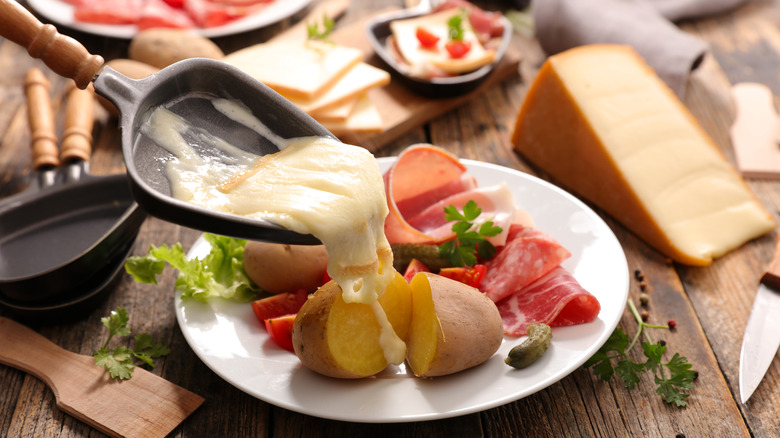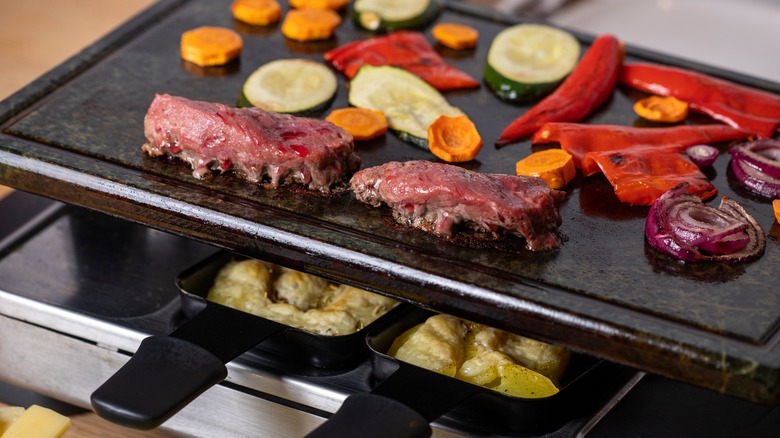What Exactly Is Raclette?
When you think of France, you might think of fancy cooking techniques and lots of butter, cream, and cheese. There are plenty of familiar French dishes that may come to the mind of international audiences — bouillabaisse, crème brûlée, crepes, omelets — but there's one dish with a French ingredient profile (cheese, cheese, and also cheese) and a French name that, funny enough, isn't French at all.
"Raclette" is a French word, but the dish itself comes from the French-speaking border regions of France and Switzerland, and is typically considered one of the signature dishes of the Swiss. Switzerland is known for a few key things around the world, such as banking, watches — and cheese. That's raclette all over, as it features a particular type of cheese — also called Raclette — made with milk from cows that have been fed grass in the summer and meadow hay in the winter. (Look, the Swiss really don't mess around when it comes to their cheese.)
As for the taste, Raclette has a flavor all its own, and it's one that changes somewhat depending on the wheel in question. The best description of it, though, is probably something like "really good Swiss cheese with a stronger smell." Longer-aged versions sold with the rind attached will have the boldest taste and aroma.
Raclette has a lot in common with fondue
Like many of the world's greatest dishes, raclette was originally a peasant food, dating back hundreds of years to when French-speaking Swiss people in Valais would heat up cheese over a fire and combine it with various ingredients. This is where the name itself comes from. In French, "racler" means "to scrape" — which is how the cheese is typically removed from its cooking vessel and served over accompaniments like bread, vegetables, or meat. If this sounds somewhat familiar, but you've got another European dish with a similar name in mind, you're on the right track: Raclette is not dissimilar from fondue in that both make melted cheese the star.
The two do differ significantly in how they're prepared and served, though. While fondue is typically made in a big pot into which you dip other foods, raclette is instead melted, then poured or scraped on top of, say, a piece of bread. This means that, unlike fondue, which is still practically liquid when you eat it, raclette tends to be slightly more set (although still deliciously melty). Additionally, whereas raclette relies on its eponymous fermented dairy product (which is sometimes sold flavored with things like pickled chiles or truffles), fondue can be made with any number of cheeses.
Ways to make raclette
One similarity to fondue is that raclette can also be made using a unique cooking method. Traditionally, there's a specific type of appliance used to make the dish: a raclette grill. Small trays are filled with cheese and placed on a flat-top grill, allowing the Raclette to melt. Above that sits a tray onto which you put the sides for your cheese. Some raclette grills feature a dual-cooking setup, with one space for the cheese trays, and a hot surface above it on which you can actually cook your other ingredients — potatoes and baguettes are favorites, but also cured meats, cornichons (those tiny little French pickles), or vegetables such as tomatoes, onion, and mushrooms.
So is raclette out of reach unless you have the money to throw around for a specialty appliance? Not at all! You can prepare raclette at home without too much difficulty. You can melt the cheese in a cast iron skillet in the oven or on the stove, or you can even cook it in an air fryer by applying the cheese directly to the other ingredients and cooking them together. Which method you use is up to you — all will yield deliciously rich and gooey results.


